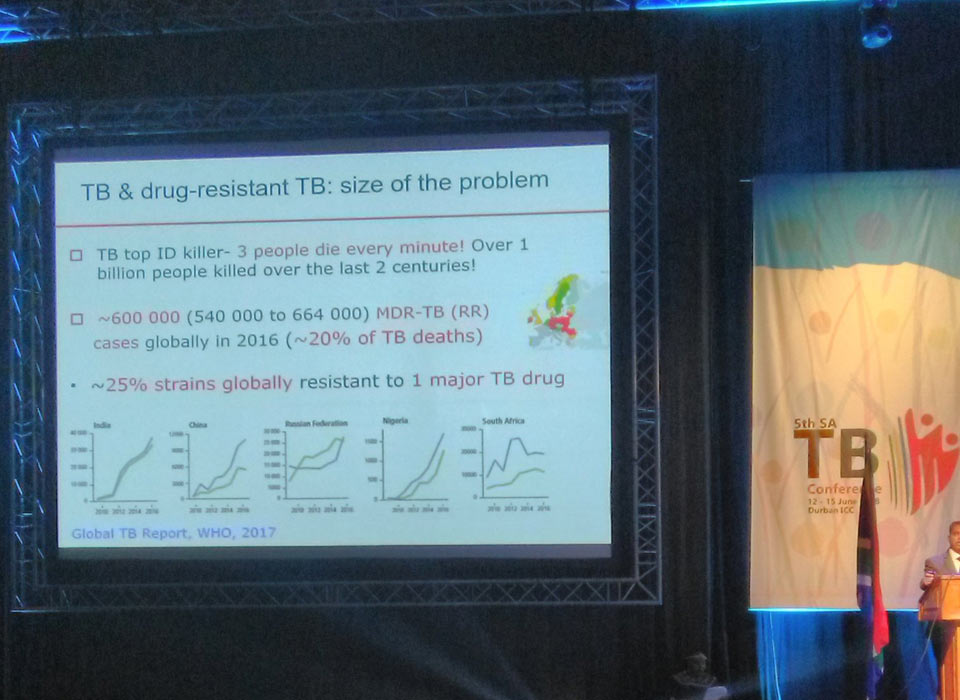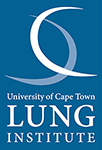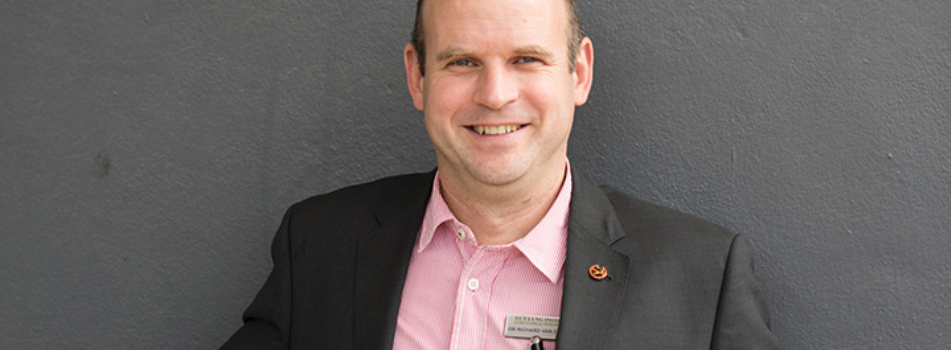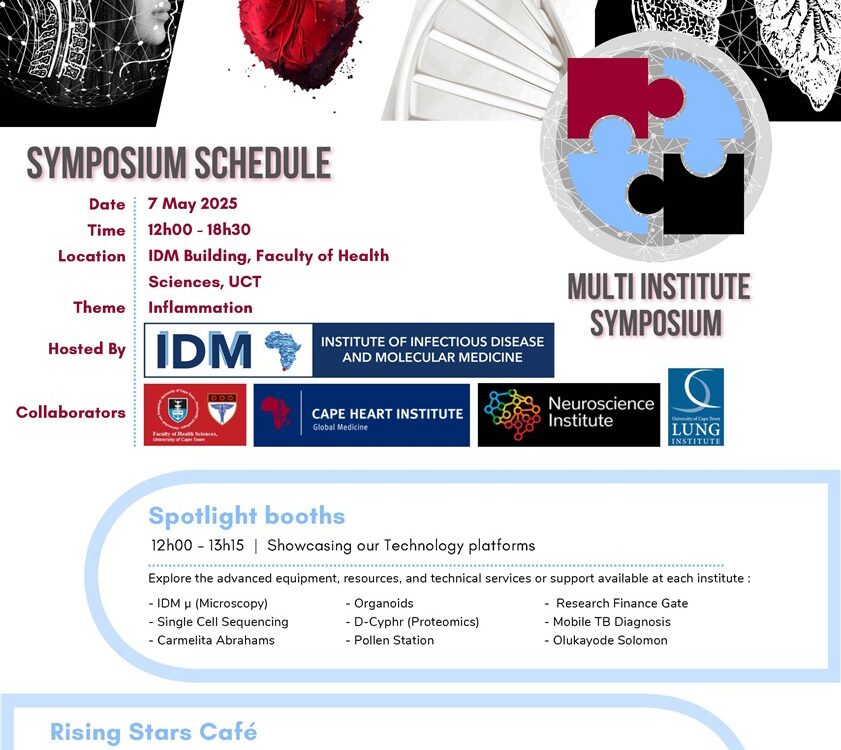
Smoking and vaping: personal choice or public health hazard?
1st June 2018
Plenary lecture on active case findings at the 5th South African TB conference held in Durban on 12-15 June 2018
13th June 2018May 2018
Twelve years ago, Richard van Zyl-Smit was named one of the very first recipients of a Discovery Foundation Academic Fellowship Award. We caught up with him for tips on how to keep your two oxygen-processors in tip-top shape.
A grateful patient once described Professor Richard van Zyl-Smit as the kind of doctor you’d expect in a Hallmark movie – the very archetype of a dedicated and deeply sincere clinician who goes the extra mile to help you understand your situation and get better.
This unassuming academic is not just a cinematic ideal, but a passionate and well-renowned advocate for lung health – so it’s no wonder that he’s respected by students, peers and patients alike. As an Associate Professor at UCT and a consultant at Groote Schuur Hospital, Prof. van Zyl-Smit is considered a national expert on smoking cessation and an international leader in establishing the association between smoking and tuberculosis.
Advancing healthcare in SA by investing in medical excellence
In 2006, the Discovery Foundation was launched to help address a shortage in medical specialists and further develop some of the country’s most talented healthcare professionals. Richard received a grant to do research in the field of pulmonology. Now, he is Head of the Lung Clinical Research Unit at the University of Cape Town Lung Institute.
A modest man himself, the professor has nonetheless has received much recognition during his career, including the SA Medical Research Council Research Day Prize; the Coleman Bequest for Airways Disease Research; the Groote Schuur Innovator award; and the South African Thoracic Society Best Publication Award. Described by Prof. Maartens, a colleague at UCT, as a “highly successful clinical researcher and a man of immense integrity,” his significant academic input (published in 55 peer-reviewed articles and cited over 1 800 times) is a testament to his passion for his field.
We chatted to Richard about how he’s pushing for academic and clinical excellence in lung health in SA.
Q: Working in healthcare is a highly valuable, but indisputably challenging, profession. What drew you to lung health?
Prof: The more I studied medicine, the more comfortable I became with the ‘detective work’ of a physician. I spent time in many sub-specialities while I was training, and the one that I liked the most was respiratory, because the field is so broad. I mean, the total internal surface area of an adult’s lungs can vary from around 50 to 75 square metres – that’s roughly the total area of one side of a tennis court! So many different diseases can affect the lung, and this keeps the work challenging and interesting.
Q: What is pulmonology all about?
Prof: Pulmonology is medical speciality that deals with diseases involving the respiratory tract. It covers everything from asthma to lung cancer, tuberculosis and pulmonary hypertension. Within the discipline of pulmonology, I have a particular interest in asthma, COPD (chronic obstructive pulmonary disease) and smoking, which stems from the tobacco-related pulmonology research I did during my Discovery Foundation fellowship.
Q: How did your research grant impact your career?
Prof: The grant allowed me to pursue a research track early on after completing my clinical training. I was exposed to basic science research and international collaboration, and got the chance to complete my PHD. This set me up with many publications and opportunities to present locally and internationally. I was also able to develop my own research interests along the journey of becoming an academic clinical scientist. My journey continues!
Q: Why is it important for more doctors to specialise in lung and respiratory health?
Prof: In South Africa, we have so many factors that impact negatively on lung health – from early childhood illness, malnutrition and infection, indoor and outdoor air pollution, tobacco smoking, mining and occupational exposure, not to mention tuberculosis. These factors place an enormous burden on respiratory health. Although we have excellent TB services, we fail patients when they don’t have TB as they now need work-up for the cause of their respiratory symptoms, and we simply don’t have the systems in place to deal with this at present.
Q: Are you currently working on any interesting research?
Prof: I’ve been collaborating with colleagues in the USA and UK on electronic cigarettes, and my current research focus is smoking cessation and indoor air pollution from wood fires and tobacco. It’s becoming clear that there’s a toxic interaction between TB, HIV, tobacco smoking and COPD in much of the world’s population, especially in developing countries like SA. The good news is that tobacco smoking is a risk factor that people have the power to change – and they should.
Q: What do pulmonologists do for fun?
Prof: Many pulmonologists that I know like to mountain bike – although many have broken bones in the process! I enjoy running and cycling myself, and I try to spend as much time with my wife, and two young boys as I can. I’ve also taken to painting and woodwork to clear the mind.
Q: What do you wish the average South African knew about lung health?
Prof: Here are my top 4 tips.
- Stay away from smoke in any form! And don’t be fooled into thinking e-cigarettes are a good alternative. Smoking, vaping, hookah pipes and so on – these do your lungs no good and should be avoided at all costs. Read the professor’s view on vaping here.
- If you do smoke – don’t while around your (or other people’s) children.
- If you develop a cough that does not go away – go and see your doctor. There are many possible causes, but making sure it isn’t TB is critical.
- Finally, if you are on treatment for asthma or COPD, make sure you stick to it. There are far too many people dying from asthma because they don’t use their medication correctly.
“Remember that good nutrition, regular physical activity and enough good quality sleep when you are healthy does wonders in building up a strong immune system – which will keep you in good stead when the winter season and all its common illnesses roll round,” says Dr Noluthando Nematswerani, Head of the Centre for Clinical Excellence at Discovery Health.
“Don’t underestimate the effect of maintaining a healthy lifestyle – and if you get ill, take the time to recover completely before you return to work and daily routines.”
The Discovery Health Medical Scheme is an independent non-profit entity governed by the Medical Schemes Act, and regulated by the Council for Medical Schemes. It is administered by a separate company, Discovery Health (Pty) Ltd, an authorised financial services provider.



